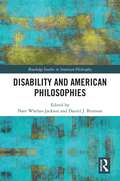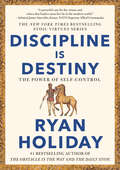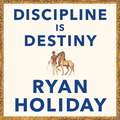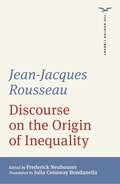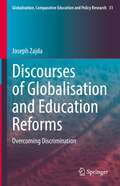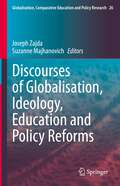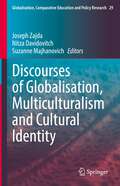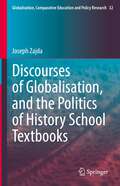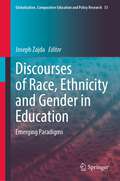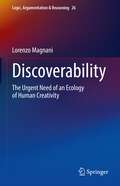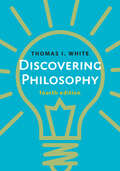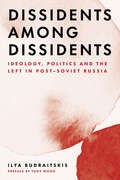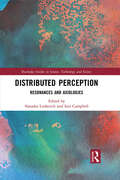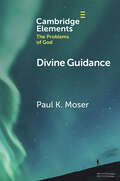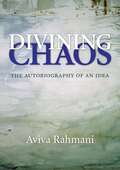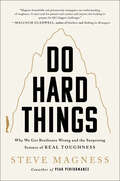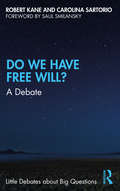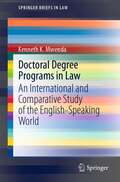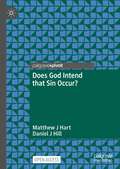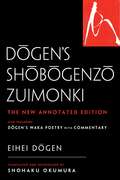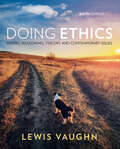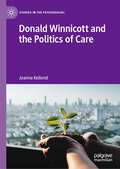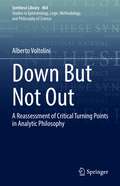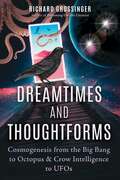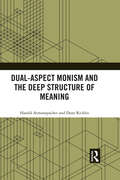- Table View
- List View
Disability and American Philosophies (Routledge Studies in American Philosophy)
by Nate Whelan-JacksonGiven basic commitments to philosophize from lived experience and a shared underlying meliorist impulse, American philosophical traditions seem well-suited to develop nascent philosophical engagement with disability studies. To date, however, there have been few efforts to facilitate research at the intersections of American philosophy and disability studies. This volume of essays seeks to offer some directions for propelling this inquiry. Scholars working in pragmatist and other American traditions consider intersections between American philosophy and work in disability studies. Consisting of three broader sections, one set of essays considers how American philosophies from contemporary Mexican philosophy to classical American pragmatism inform descriptions of disability and efforts at liberation. The next offer accounts of how American philosophies disclose alternative conceptions of epistemic and ethical issues surrounding disability. Finally, a section considers "living issues" of disability, including essays on parenting, immigration policy, and art education. Throughout, these works provide direction and orientation for further investigation at the intersection of American philosophies and disability studies.
Discipline Is Destiny: The Power of Self-Control (The Stoic Virtues Series)
by Ryan HolidayThe instant New York Times, Wall Street Journal, and USA Today Bestseller!In his New York Times bestselling book Courage is Calling, author Ryan Holiday made the Stoic case for a bold and brave life. In this much-anticipated second book of his Stoic Virtue series, Holiday celebrates the awesome power of self-discipline and those who have seized it.To master anything, one must first master themselves–one&’s emotions, one&’s thoughts, one&’s actions. Eisenhower famously said that freedom is really the opportunity to practice self-discipline. Cicero called the virtue of temperance the polish of life. Without boundaries and restraint, we risk not only failing to meet our full potential and jeopardizing what we have achieved, but we ensure misery and shame. In a world of temptation and excess, this ancient idea is more urgent than ever.In Discipline is Destiny, Holiday draws on the stories of historical figures we can emulate as pillars of self-discipline, including Lou Gehrig, Queen Elizabeth II, boxer Floyd Patterson, Marcus Aurelius and writer Toni Morrison, as well as the cautionary tales of Napoleon, F. Scott Fitzgerald and Babe Ruth. Through these engaging examples, Holiday teaches readers the power of self-discipline and balance, and cautions against the perils of extravagance and hedonism.At the heart of Stoicism are four simple virtues: courage, temperance, justice, and wisdom. Everything else, the Stoics believed, flows from them. Discipline is Destiny will guide readers down the path to self-mastery, upon which all the other virtues depend. Discipline is predictive. You cannot succeed without it. And if you lose it, you cannot help but bring yourself failure and unhappiness.
Discipline is Destiny: The Power of Self-Control
by Ryan HolidayAn inspiring anthem to the power, promise and challenges of self-control, the second in a series examining the timeless Stoic virtues from #1 New York Times bestselling author Ryan HolidayThe inscription on the Oracle of Delphi says: 'Nothing in excess.' C.S. Lewis described temperance as going to the 'right length but no further.' Easy to say, hard to practice - and if it was tough in 300 BCE, or in the 1940s, it feels all but impossible today. Yet it's the most empowering and important virtue any of us can learn.Drawing on ancient Stoic wisdom and examples across history and around the world, Ryan Holiday shows why self-control is so vital, and how to cultivate it in our own lives. Moderation is not about abstinence: it is about creativity, self-respect, focus and balance. Without it, even the most positive traits become vices. But with it, happiness and success are assured: it is the only way to live an extraordinary, fulfilled and effective life.
Discourse on the Origin of Inequality (The Norton Library #0)
by Jean Jacques RousseauAbout Discourse on the Origin of Inequality The Norton Library edition of Rousseau’s Discourse features an inviting and readable translation by Julia Conaway Bondanella that makes the text accessible to the modern English reader while faithfully preserving the power and clarity of Rousseau’s voice and style of argumentation. A thorough introduction by Frederick Neuhouser—"one of the most brilliant philosophical readers of Rousseau that we have” (Christopher Brooke)—provides historical and intellectual context for the Discourse and its major arguments. Annotations throughout the text clarify obscure or ambiguous terms and references.
Discourses of Globalisation and Education Reforms: Overcoming Discrimination (Globalisation, Comparative Education and Policy Research #31)
by Joseph ZajdaThis book focuses on discourses of effective learning environments globally for reducing discrimination in schools. It offers innovative ideas concerning the future directions that education and policy reforms could take, in order to promote equality, social justice, and access to quality of education for all.The chapters offer a timely analysis of current issues affecting schooling and strategies for creating effective learning environments globally for overcoming discriminations in schools. It is argued that that one of the most significant variables in creating effective learning environments for reducing classroom discrimination is the student’s cultural identity, the self-concept and self-esteem. The next variables influencing students’ learning environment are motivational strategies, self-regulated learning, and students’ active engagement in constructivist learning. This book contributes in a very scholarly way, to a more holistic understanding of the nexus between globalisation, comparative education research and education reforms for reducing discrimination. It will be beneficial for a broad spectrum of users, including policy-makers, academics, graduate students, education policy researchers, administrators, and practitioners.
Discourses of Globalisation, Ideology, Education and Policy Reforms (Globalisation, Comparative Education and Policy Research #26)
by Joseph Zajda Suzanne MajhanovichThis book presents a global overview of discourses of globalization, current research in education and education policy reforms. It first examines globalisation, education and policy research and reforms in education, including coverage of main trends in education and policy reforms globally, as well as specific policy issues such as equity, inclusive schooling and quality education for all. Next, it offers a comparative perspective in evaluating the ambivalent and problematic relationship between globalisation, ideology, the state and education reforms globally. One significant impact of globalization on education policy and reforms is the competitive comparison of education systems. These comparisons are usually based on common achievement tests such as TIMSS, PIRLS and PISA. Major policy reforms are frequently justified with reference to these achievement data. The book features coverage of education reforms globally, and academic achievement syndrome. Not only do the chapters offer a timely analysis of current issues shaping education policy research, but the book also contains ideas concerning the future directions that education and policy reforms could take, to offer more democratic and equitable education. Respective chapters critically assess the dominant discourses and debates on education and policy reforms. By doing so, it provides a comprehensive view of the diverse and intersecting discourses on globalisation and policy-driven reforms in education.
Discourses of Globalisation, Multiculturalism and Cultural Identity (Globalisation, Comparative Education and Policy Research #29)
by Joseph Zajda Suzanne Majhanovich Nitza DavidovitchThis book examines dominant discourses in multiculturalism and cultural identity globally. It critiques dominant discourses and debates pertaining to multiculturalism and cultural identity, set against the current backdrop of growing social stratification and unequal access to quality education. It addresses current discourses concerning globalisation, ideologies and the state, as well as approaches to constructing national, ethnic and religious identities in the global culture. It explores the ambivalent and problematic connections between the state, globalisation, and the construction of cultural identity. The book also explores conceptual frameworks and methodological approaches applicable to research on the state, globalisation, multiculturalism and identity politics. Drawing on diverse paradigms, ranging from critical theory to globalisation, the book, by focusing on globalisation, ideology and cultural identity, critically examines recent research dealing with cultural diversity and its impact of identity politics. Given the need for a multiple perspective approach, the authors, who have diverse backgrounds and hail from different countries and regions, offer a wealth of insights, contributing to a more holistic understanding of the nexus between multiculturalism and national identity. With contributions from key scholars worldwide, the book should be required reading for a broad spectrum of users, including policy-makers, academics, graduate students, education policy researchers, administrators, and practitioners.
Discourses of Globalisation, and the Politics of History School Textbooks (Globalisation, Comparative Education and Policy Research #32)
by Joseph ZajdaThis book focuses on discourses of the politics of history education and history textbooks. It offers a new insight into understanding of the nexus between ideology, the state, and nation-building, as depicted in history education and school textbooks. It especially focuses on the interpretation of social and political change, significant events, looking for possible biases and omissions, leadership and the contribution of key individuals, and continuities. The book discusses various aspects of historical narratives, and some selected key events in defining identity and nation-building. It considers the role of historiography in dominant historical narratives. It analyses history education, in both local and global settings, and its significance in promoting values education and intercultural and global understanding. It is argued that historical narratives add pedagogies, grounded in constructivist, metacognitive and transformational paradigms, have the power to engage the learner in significant and meaningful learning experiences, informed by multiple discourses of our historical narratives and those of other nations.
Discourses of Race, Ethnicity and Gender in Education: Emerging Paradigms (Globalisation, Comparative Education and Policy Research #33)
by Joseph ZajdaThis book examines dominant discourses affecting race, ethnicity and gender in education and societies globally. It presents cutting-edge research on the major global trends in globalization, race, ethnicity and gender education globally. Using diverse paradigms, ranging from critical theory to discourse analysis, the book examines major trends in race, ethnicity and gender research, with a focus on the ambivalent and problematic relationship between race, ethnicity and gender discourses, ideology and the state. It discusses and critiques key issues in race, ethnicity and gender research. Readers will gain a more holistic understanding of the nexus between race, ethnicity and gender discourses and dominant ideologies, both locally and globally. It also provides an easily accessible, practical, yet scholarly insights into local and global trends in the field of race, ethnicity and gender education. With contributions from key scholars worldwide, this book will be useful to a broad spectrum of readers, including policy-makers, academics, graduate students, education policy researchers, administrators and practitioners.
Discoverability: The Urgent Need of an Ecology of Human Creativity (Logic, Argumentation & Reasoning #26)
by Lorenzo MagnaniThe book analyses the concept of discoverability, and some current epistemological problems related to it, with a special attention to science. It shows that discoverability is closely related to the sustainability of human creativity in an "eco-cognitive" perspective. Advocating the need of an integral ecology and leveraging the important concept of abduction, it demonstrates that an ecology of human creativity should have priority over other needs, i.e that the first ecological duty is to protect and sustain discoverability. Enhancing discoverability will protect human creativity, and it is exactly human creativity, a form of innovative abductive cognition, that can promote the implementation of the other kinds of ecology. The author guides readers through a comprehensive discussion on the concept of discoverability, eco-cognitive situatedness, and eco-cognitive openness and closure alike. By describing some key real-world examples, he highlights the main challenges that are currently posed to human creativity and epistemic integrity. He also describes future eco-cognitive settings, discussing the problem of overcomputationalism and suggesting a reinterpretation of the role of human knowledge. Overall, this book fills an important gap in the literature on the nexus abduction – creativity – discovery, offering a source of inspiration to philosophers, epistemologists, and cognitive scientists. Yet, it also addresses researchers in other disciplines interested in the problems of scientific discovery and epistemic integrity of research.
Discovering Philosophy
by Prof. Thomas I. WhiteAre we free or determined? Are things really the way they appear to be? What&’s the difference between right and wrong? Can God&’s existence be demonstrated?Discovering Philosophy looks at these and other fundamental questions that have bedeviled thinkers for centuries. Designed for students who are more comfortable with secondary than primary sources, Discovering Philosophy is both accessible and intellectually challenging. While it examines the ideas of traditional philosophers, it also considers perspectives that have historically been underrepresented (feminist philosophers and Native American thought), draws examples from popular culture, and considers cutting-edge philosophical questions raised by scientific discoveries (are dolphins nonhuman persons with rights?).Each chapter includes discussion questions, boxed highlights, and suggestions for further reading.
Dissidents among Dissidents: Ideology, Politics and the Left in Post-Soviet Russia
by Ilya BudraitskisHow have the fall of the USSR and the long dominance of Putin reshaped Russian politics and culture?Ilya Budraitskis, one of the country's most prominent leftist political commentators, explores the strange fusion of free-market ideology and postmodern nationalism that now prevails in Russia, and describes the post-Soviet evolution of its left. He incisively describes the twists and contradictions of the Kremlin's geopolitical fantasies, which blend up-to-date references to "information wars" with nostalgic celebrations of the tsars of Muscovy. Despite the revival of aggressive Cold War rhetoric, he argues, the Putin regime takes its bearings not from any Soviet inheritance, but from reactionary thinkers such as the White émigré Ivan Ilyin.Budraitskis makes an invaluable contribution by reconstructing the forgotten history of the USSR's dissident left, mapping an entire alternative tradition of heterodox Marxist and socialist thought from Khrushchev's Thaw to Gorbachev's perestroika. Doubly outsiders, within an intelligentsia dominated by liberal humanists, they offer a potential way out of the impasse between condemnations of the entire Soviet era and blanket nostalgia for Communist Party rule--suggesting new paths for the left to explore.
Distributed Perception: Resonances and Axiologies (Routledge Studies in Science, Technology and Society)
by Natasha LushetichContributors to this book include key theorists and practitioners from media theory, Native Science, bio-media and sound art, philosophy, art history and design informatics. Collectively, they examine the becoming-technique of animal-human- machinic perceptibilities; and micro-perceptions that lie beneath the threshold of known perceptions yet create energetic vibrations. Who, what, and where perceives, and how? What are the sedimentations, inscriptions and axiologies of animal, human and machinic perceptions? What are their perceptibilities? Deleuze uses the word ‘visibilities’ to indicate that visual perception isn’t just a physiological given but cues operations productive of new assemblages. Perceptibilities are, by analogy, spatio- temporal, geolocative, kinaesthetic, audio-visual, and haptic operations that are always already memory. In the case of strong inscriptions, they are also epigenetic events. The contributors show distributed perception to be a key notion in addressing the emergence and persistence of plant, animal, human and machine relations. An invaluable reference for students and scholars in a range of areas including Media Theory, Sociology, Philosophy, Art and Design.
Divine Guidance: Moral Attraction in Action (Elements in the Problems of God)
by Paul K. MoserIf God exists and is perfectly good, God tries to guide people. A twofold question then arises: How does God (try to) guide people, and to what end? Problems of divine guidance for humans, according to this volume, are real and serious, but they are manageable once we clarify the kind of God at issue. According to the volume's main thesis, if God has a perfect moral character accompanied by certain redemptive purposes for humans, the puzzling nature of divine guidance for them need not preclude the reality of such guidance. It is, this volume contends, a live option for God to guide or lead humans toward goodness, even if the leading is not fully explainable by humans. The voluntary moral attraction of cooperative humans by divine goodness is central to divine guidance, and it can illuminate the kind of evidence to be expected from God.
Divining Chaos: The Autobiography of an Idea
by Aviva RahmaniA spirited memoir by artist Aviva Rahmani, offering a relatable narrative to discuss trigger point theory and the importance of eco-art activism.Divining Chaos is an intimate personal memoir of unparalleled transparency into the moments in Rahmani's life that shaped her as an artist and activist. Detailing the history that led her to two seminal projects—Ghost Nets, restoring a coastal town dump to flourishing wetlands, and The Blued Trees Symphony, which applied her premises to challenge natural gas pipelines with a novel legal theory about land use—Rahmani shares the decisions that shaped her life’s work and thinking. Her discussions about trigger point theory argue for how to predict, confront, and determine outcomes to the ecological challenges we face today.
Do Hard Things: Why We Get Resilience Wrong and the Surprising Science of Real Toughness
by Steve MagnessNational Bestseller"In Do Hard Things, Steve Magness beautifully and persuasively reimagines our understanding of toughness. This is a must-read for parents and coaches and anyone else looking to prepare for life's biggest challenges." -- Malcolm Gladwell, author of Outliers and Talking to Strangers and host of the Revisionist History podcastFrom beloved performance expert, executive coach, and coauthor of Peak Performance Steve Magness comes a radical rethinking of how we perceive toughness and what it means to achieve our high ambitions in the face of hard things.Toughness has long been held as the key to overcoming a challenge and achieving greatness, whether it is on the sports field, at a boardroom, or at the dining room table. Yet, the prevailing model has promoted a mentality based on fear, false bravado, and hiding any sign of weakness. In other words, the old model of toughness has failed us.Steve Magness, a performance scientist who coaches Olympic athletes, rebuilds our broken model of resilience with one grounded in the latest science and psychology. In Do Hard Things, Magness teaches us how we can work with our body – how experiencing discomfort, leaning in, paying attention, and creating space to take thoughtful action can be the true indications of cultivating inner strength. He offers four core pillars to cultivate such resilience: Pillar 1- Ditch the Façade, Embrace RealityPillar 2- Listen to Your BodyPillar 3- Respond, Instead of React Pillar 4- Transcend Discomfort Smart and wise all at once, Magness flips the script on what it means to be resilient. Drawing from mindfulness, military case studies, sports psychology, neuroscience, psychology, and philosophy, he provides a roadmap for navigating life’s challenges and achieving high performance that makes us happier, more successful, and, ultimately, better people.
Do We Have Free Will?: A Debate (Little Debates about Big Questions)
by Robert H Kane Carolina SartorioIn this little but profound volume, Robert Kane and Carolina Sartorio debate a perennial question: Do We Have Free Will? Kane introduces and defends libertarianism about free will: free will is incompatible with determinism; we are free; we are not determined. Sartorio introduces and defends compatibilism about free will: free will is compatible with determinism; we can be free even while our actions are determined through and through. Simplifying tricky terminology and complicated concepts for readers new to the debate, the authors also cover the latest developments on a controversial topic that gets us entangled in questions about blameworthiness and responsibility, coercion and control, and much more. Each author first presents their own side, and then they interact through two rounds of objections and replies. Pedagogical features include standard form arguments, section summaries, bolded key terms and principles, a glossary, and annotated reading lists. Short, lively and accessible, the debate showcases diverse and cutting-edge work on free will. As per Saul Smilansky’s foreword, Kane and Sartorio, "present the readers with two things at once: an introduction to the traditional free will problem; and a demonstration of what a great yet very much alive and relevant philosophical problem is like." Key Features: Covers major concepts, views and arguments about free will in an engaging format Accessible style and pedagogical features for students and general readers Cutting-edge contributions by preeminent scholars on free will.
Doctoral Degree Programs in Law: An International and Comparative Study of the English-Speaking World (SpringerBriefs in Law)
by Kenneth K. MwendaThis book offers a critical and insightful study of various doctoral programs in law, focusing on the English-speaking world. That the structures of doctoral degree programs in law differ between the United States and much of the Commonwealth are an issue that requires no debate. What is missing in the discourse, however, is a narrative on how these programs are structured and how they compare. This book attempts to fill that gap. A key objective of the study is to provide an international and comparative analysis of the efficacy of the American- and British-styled models of law doctorates. In so doing, it provides a conceptual and theoretical framework for the development of effective doctoral programs in law, contending that the defining characteristic of a doctorate is that it recognizes an independent contribution to the subject rather than the completion of taught coursework, however, advanced. The book goes on to examine the concept of a higher doctorate in law as a possible means of strengthening the concept of a law doctorate in legal academia.This book was written against the backdrop of the recently adopted Global Convention on the Recognition of Qualifications concerning higher education. It was adopted by the UNESCO General Conference in Paris on November 25, 2019, making it the first United Nations treaty on higher education with a global scope. The target audience of the book includes scholars in higher education; scholars in legal education; law school deans and administrators; law professors and students; Ministries of Higher Education in countries around the globe; accrediting agencies for doctoral studies; bar admission and legal education societies; and UNESCO and other international organizations.
Does God Intend that Sin Occur?
by Matthew J Hart Daniel J HillThis open access book argues, from a detailed consideration of the Christian Scriptures, that God intends that sin occur. It swims against the tide of current thinking in philosophy of religion, arguing for an unfashionable conclusion. The book begins by considering the history of views on the question, paying particular attention to the Reformed or Calvinistic tradition. The heart of the book is a detailed examination of key passages from the Christian Scriptures that, it is argued, show that God does intend that sin occur. It also discusses in detail two alternative views that could be used to reinterpret these texts, one view that God intends only that the substratum of the sinful action occur, not the sin itself, and the other that God acts because a sin will occur but not intending that that sin occur. The book argues that these interpretative strategies, even when combined together, do not produce a plausible interpretation of the texts adduced.
Dogen's Shobogenzo Zuimonki: The New Annotated Translation—Also Including Dogen's Waka Poetry with Commentary
by Eihei DogenThe clearest and most approachable teachings from Dogen, the most famous thinker and writer in Zen Buddhism.Discover the teachings of the preeminent Zen Master Dogen in his own words, written down by his Dharma successor, Koun Ejo. This edition includes both the Shobogenzo Zuimonki and translations of and commentary on Dogen&’s luminously evocative waka poetry. Distinct from Dogen&’s similarly titled magnum opus (simply called the Shobogenzo), the Shobogenzo Zuimonki can be read as a highly practical manual of Buddhist practice. Consisting of straightforward and accessible teachings and making more limited use of the allusion, wordplay, and metaphor that characterize the essays in the Shobogenzo, this work is an essential read for any student of Zen Buddhism. Among the many topics covered, Dogen especially emphasizes the following points: seeing impermanence, departing from the ego-centered self, being free from greed, giving up self-attachment, following the guidance of a true teacher, and the practice of zazen, specifically shikantaza, or &“just sitting.&” Additionally, this translation of the Shobogenzo Zuimonki has extensive notes, which help to provide you with a new way of approaching the text. The collection of waka poems included in this volume are a beautiful artistic expression of the Dharma. Rarely seen in this large of a collection or with commentary, this poetry offers unique insight into an important expression of Dogen&’s teachings. By the spring wind my words are blown and scattered people may see them the song of flowers These teachings, which have informed teachers and practitioners alike throughout the centuries, will deepen your knowledge, understanding, and experience of the Soto Zen tradition.
Doing Ethics (Sixth Edition): Moral Reasoning, Theory, And Contemporary Issues
by Lewis VaughnTeaching students how to actively apply moral reasoning Doing Ethics is the best-selling book for courses with an applied emphasis. It teaches moral decision making as an active process, giving students the theoretical and logical tools required to do ethics. The Sixth Edition offers expanded coverage of relevant issues, including race and racism, health care, and tolerance and civility online and in public spaces. New activities in InQuizitive—Norton's award-winning adaptive learning tool—have been expanded to include material on contemporary topics, enabling students to apply moral reasoning to the issues they care about, both in the course and beyond.
Donald Winnicott and the Politics of Care (Studies in the Psychosocial)
by Joanna KellondThis book explores the significance of psychoanalyst Donald Winnicott’s ideas for contemporary debates about care. Locating Winnicott in relation to a range of fields, including psychology, philosophy, sociology, critical theory and feminist theory, it examines the implications of his thinking for understanding and transforming the relationship between care and society. Winnicott was unique amongst psychoanalysts for the emphasis he placed on care in the development of subjectivity. The book unpacks Winnicott’s understanding of care and assesses its relevance for conceptions of social responsibility, justice and transformation. In a world where care is in crisis, how might we theorise the conditions necessary for the development of caring subjectivities, and is it possible to infer a relationship between those conditions and progressive social change? This unique book will be of interest to readers in psychosocial studies, politics and anyone concerned with thinking about the relationship between care and social transformation.
Down But Not Out: A Reassessment of Critical Turning Points in Analytic Philosophy (Synthese Library #464)
by Alberto VoltoliniThis book provides a detailed reassessment of the role and impact of analytic philosophy in the overall philosophical debate. It does so by focusing on several important turning points that have been particularly significant for analytic philosophy’s overall history, such as Bertrand Russell's critique of Meinong, and the vindication of Heidegger's famous 'Nothing'- sentence. In particular, the book scrutinizes whether the theses written about such points have been convincingly argued for, or whether they have gained attraction as a type of rhetorical device. Due to its broad nature, this book is of interest to scholars interested in all aspects of philosophy, at both graduate level and above.
Dreamtimes and Thoughtforms: Cosmogenesis from the Big Bang to Octopus and Crow Intelligence to UFOs
by Richard Grossinger• Examines animal intelligences within a greater evolutionary context, detailing in particular the remarkable intelligence of crows and octopuses • Looks at the Australian Aborigine Dreamtime as an attempt to understand the combined geological and geomantic landscape • Investigates a range of ideas as they relate to the intersections of consciousness and reality, including reincarnation, past-life memories, ghosts, and UFOs From the origins of the cosmos to the microbiome, COVID-19 pandemic, UFOs, and the shapeshifting of octopuses and language of crows, Richard Grossinger traverses the mysteries and enigmas that define our universe and personal reality. Beginning his narrative with the Big Bang, origin of the Milky Way, and birth of our solar system, Grossinger offers a chronology of Earth&’s geological, climatological, biological, and sociological evolution, leading to the current environmental and psychospiritual crisis. He explores the origin of cell life, RNA-DNA, and larger biomes, detailing in particular the remarkable intelligence of crows and octopuses. He uses the Australian Aborigine Dreamtime to understand landscapes as thoughtforms. He then offers reimaginings, from the perspective of &“dreamings,&” of a wide variety of animals, including tardigrades, llamas, sea turtles, pigeons, bees, and coyotes. Examining the scientific dilemmas and paradoxes of consciousness, time, and quantum entanglement, Grossinger carries these into the range of issues around reincarnation, past-life memories, messages from the afterlife, and ghosts. Sharing exercises from his personal practice, Grossinger makes a distinction between the Buddhist description of reality and how Buddhist practitioners create an operating manual for the universe and an assured path of salvation. The author then examines UFOs and their connections to elementals, fairies, and cryptids in terms of psychoids, Jung&’s term for transconscious processes that enter our world as autonomous entities. Taking the reader on a journey through the seen and unseen universe, from the Big Bang to the imaginal landscape of Dreamtime, Grossinger shows that matter is infused with spirit from its very beginning.
Dual-Aspect Monism and the Deep Structure of Meaning
by Harald Atmanspacher Dean RicklesDual-Aspect Monism and the Deep Structure of Meaning investigates the metaphysical position of dual-aspect monism, with particular emphasis on the concept of meaning as a fundamental feature of the fabric of reality. As an alternative to other positions—mainly dualism, physicalism, idealism—that have been proposed to understand consciousness and its place in nature, the decompositional version of dual-aspect monism considers the mental and the physical as two aspects of one underlying undivided reality that is psychophysically neutral. Inspired by analogies with modern physics and driven by its conceptual problems, Wolfgang Pauli, Carl Gustav Jung, Arthur Eddington, John Wheeler, David Bohm and Basil Hiley are the originators of the approaches studied. A radically novel common theme in their approaches is the constitutive role of meaning and its deep structure, relating the mental and the physical to a psychophysically neutral base.The authors reconstruct the formal structure of these approaches, compare their conceptual emphases and their relative strengths and weaknesses. They also address a number of challenging themes for current and future interdisciplinary research, both theoretical and empirical, that arise from the presented frameworks of thinking. Dual-Aspect Monism and the Deep Structure of Meaning will be of interest to researchers and advanced students working in consciousness studies, philosophy of mind, philosophy of science, philosophy of physics, metaphysics, and the history of 20th-century philosophy and physics.
